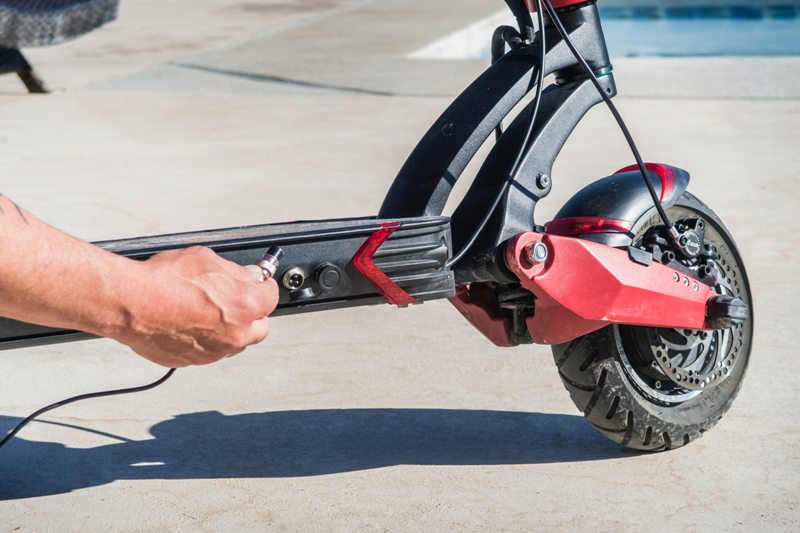Electric scooters have become a popular mode of transportation in recent years, offering a convenient and environmentally friendly alternative to traditional gasoline-powered scooters. However, like any mode of transportation, electric scooters have their own set of disadvantages that should be considered before making a purchase.
In this blog post, we’ll take a look at nine of the main disadvantages of electric scooters, from limited range and power to the cost and maintenance required to keep them running. Whether you’re considering buying an electric scooter for the first time or are already a seasoned rider, it’s important to be aware of the potential downsides before making a decision.
9 Disadvantages of Electric Scooters
Electric scooters may not be as powerful as traditional scooters, which can be a disadvantage for those who need a more powerful vehicle for commuting or other purposes.
Before making the decision to purchase an electric scooter, it’s important to consider the following potential drawbacks:
1. Limited Range
One of the main disadvantages of electric scooters is that they have a limited range compared to traditional gas-powered scooters. This can be a problem for those who need to travel long distances, as they may need to stop and recharge the scooter frequently.
The range of an electric scooter can vary widely depending on the model and the conditions it is used in, but most models have a range of around 20-30 miles on a single charge.
2. Frequent Charging
To maintain their range, electric scooters need to be charged frequently. This can be a hassle for those who are used to the convenience of filling up their gas-powered scooter at a gas station.
Electric scooters must be plugged into an outlet to charge, which can take several hours depending on the model.

This means that you may need to plan your travel around when you have access to an outlet or carry a portable charger with you if you are going to be away from home for an extended period.
3. High Initial Cost
Another disadvantage of electric scooters is that they can be expensive to purchase. While the cost of electric scooters has come down in recent years, they still tend to be more expensive than traditional gas-powered scooters.
This can be a barrier for those who are on a tight budget and may make it more difficult to justify the cost of an electric scooter.
4. Maintenance Costs
In addition to the initial purchase price, electric scooters may also have higher maintenance costs compared to traditional scooters.
This is because they have more complex systems, such as batteries and electronic components, which can be more expensive to repair or replace.
5. Durability
Some people may be concerned about the durability of electric scooters compared to traditional gas-powered scooters.
While electric scooters have come a long way in terms of durability, they may not be as robust as traditional scooters, which can be a concern if you plan to use your scooter for commuting or other heavy-duty purposes.
6. Weather Sensitivity
Electric scooters can be affected by weather, such as rain or cold temperatures, which can reduce their range and performance. If you live in an area with extreme weather conditions, this may be a concern when considering an electric scooter.
7. Lack Of Power
While electric scooters have improved in terms of power and performance in recent years, they may still not be as powerful as traditional gas-powered scooters.

This can be a disadvantage for those who need a more powerful vehicle for commuting or other purposes.
8. Limited Carrying Capacity
Electric scooters generally have limited carrying capacity, which can be a problem for those who need to transport heavy loads or multiple people.
This can be especially frustrating if you are used to the convenience of a gas-powered scooter, which may have a larger carrying capacity.
9. Limited Availability
Finally, electric scooters may not be as widely available as traditional gas-powered scooters. This can be a problem if you live in a remote area or a place where electric scooters are not as popular, as it may be more difficult to find a dealer or repair shop if you need one.
Conclusion
Electric scooters have several disadvantages that may make them less appealing to some people. They have a limited range and require frequent charging, which can be a hassle for those who need to travel long distances. They also tend to be more expensive to purchase and maintain, and may not be as durable as traditional gas-powered scooters. Additionally, electric scooters can be affected by weather and may not be as powerful as traditional scooters.
Finally, they may have limited carrying capacity and may not be as widely available as traditional scooters. While electric scooters do have some advantages, such as being environmentally friendly and requiring less maintenance, these disadvantages may make them less appealing to some people.
FAQs
Why Do People Not Like Electric Scooters?
There are several reasons why people may not like electric scooters. One reason is that they have a limited range compared to traditional gas-powered scooters, which can be a problem for those who need to travel long distances.
They also require frequent charging and may have higher maintenance costs, which can be a hassle for some people. Additionally, electric scooters may not be as powerful or as durable as traditional scooters, which can be a concern for those who need a more reliable vehicle
Do Electric Scooters a Lot of Electricity?
Electric scooters do use a lot of electricity, but the amount of electricity they use depends on the size of the battery, the distance traveled, and the terrain.
On average, an electric scooter with a fully charged battery can travel about 20-30 miles before needing to be recharged.
However, factors such as hills, headwinds, and heavy loads can all impact the distance that an electric scooter can travel on a single charge.
Is an Electric Scooter Worth It?
Whether or not an electric scooter is worth it depends on your individual circumstances and needs. They may be a good choice for those who need a convenient and environmentally friendly mode of transportation for short distances, but may not be as practical for long distance travel or for those who need a more powerful or durable vehicle.
Do Electric Scooters Pollute The Air?
Electric scooters do not produce any emissions, so they do not contribute to air pollution in the same way that traditional gas-powered scooters do. However, the electricity used to charge the battery for an electric scooter may come from fossil fuel sources, which can contribute to air pollution.
The overall environmental impact of electric scooters depends on the source of the electricity used to charge them.
About the Author

Seba K
Hi, I m Seba and I am the author of this blog.
Electric scooters have been my passion since I bought my first one back in 2016.
Since then, I have experimented with numerous models and gained a wealth of knowledge about electric scooters.
I always keep myself updated with the latest product releases and advancements in this field.
I am delighted to share my experiences and insights with you here.
My background includes a degree in Avia Engineering, and I have a keen interest in outdoor sports and traveling.




